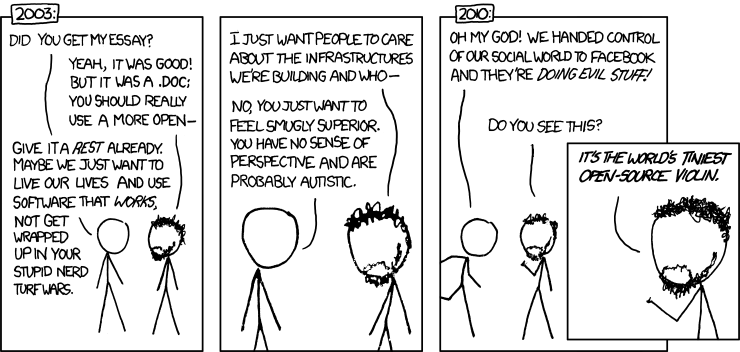How should we (reference librarians, systems people, and users) work together to better exploit the possibilities of open source systems so we can focus on discovery and understanding instead of the mechanics of searching?
I mention this because I think it's not only a good question, it's a very important question. How indeed should reference librarians get involved in systems work so that we build systems of understanding and not just search?
As if on cue, Eric Lease Morgan presented some possible answers to this question in a piece called The Next Next-Generation Catalog:
Instead of focusing on find, the profession needs to focus on the next steps in the process. After a person does a search and gets back a list of results, what do they want to do? First, they will want to peruse the items in the list. After identifying items of interest, they will want to acquire them. Once the selected items are in hand users may want to print, but at the very least they will want to read. During the course of this reading the user may be doing any number of things. Ranking. Reviewing. Annotating. Summarizing. Evaluating. Looking for a specific fact. Extracting the essence of the author’s message. Comparing & contrasting the text to other texts. Looking for sets of themes. Tracing ideas both inside and outside the texts. In other words, find and acquire are just a means to greater ends. Find and acquire are library goals, not the goals of users.
I also want to bring attention to Eric's specific call to those engaged in information literacy.
People want to perform actions against the content they acquire. They want to use the content. They want to do stuff with it. By expanding our definition of “information literacy” to include things beyond metadata and bibliography, and by combining it with the power of computers, librarianship can further “save the time of the reader” and thus remain relevant in the current information environment. Focusing on the use and evaluation of information represents a growth opportunity for librarianship.
In response to Eric's promotion of indexing tools, Kathryn Greenhill commented:
I think librarians need to look toward using textual analysis tools from the disciplines they serve and incorporate it into their “beyond discovery” layers.
It’s a pity that often subject liaison librarians in universities do this job because they are not so interested in “techie things”….How to get them to understand that this is their role will be interesting.
[I'm assuming that her last comment is missing a "not do" so that it reads, "It’s a pity that often subject liaison librarians in universities do not do this job because they are not so interested in “techie things” - I'm going to send her an email to clarify this matter.]
I think there is an significant reluctance by Information Literacy librarians to introduce genuinely useful tools (such as Zotero) to users because after years of teaching users just how to use the catalogue, many teaching librarians refuse to do any teaching of tools. Add to this scenario that an information librarian generally has only a very brief period of time to introduce large and hairy concepts to students such as genre theory, critical reading, and transliteracy, and you have librarians who will refuse to teach students textual tools on principle.
But "tool choice" is not the same as "teaching a tool".
So let us recognize that a reader's choice of information tool fundamentally affects that user's "use of information". Let us embrace information tool choice and use as a inherent component of Information Literacy. Let us ask ourselves why we promote the use of CINAHL instead of PubMed, WorldCat instead of OpenLibrary, RefWorks instead of Zotero...
OK, I admit that doesn't sound very poetic. Let's try that again:
I know I'm not alone here. While still in the minority, I believe that there are many librarians who believe that tool choice and development should be a fundamental component of our profession's work. In face, there are librarians who hold that tool creation is essential for our profession's survival. Also published yesterday, here is K. G. Schneider:
The fundamental problem with the proprietary software model is not one of evil ownership or grasping vendors. I’ve seen both of those occur in the open source software community. The problem with proprietary library management software–from a high-level perspective, profession-wide–is that it makes us stupid. It deprofessionalizes who we are and disengages us from tool creation.
Conversely, every librarian who engages in tool creation to any degree improves the state of librarianship for all of us. This has been true since some guy in a toga put holes in a wall to store the papyrus, and it was true in the 19th century when we agreed as a profession on the size of catalog cards (which led to our early adoption of standards and network-level records), and it is true in the open source community today.
And her conclusions about why librarianship needs open source dovetails nicely with why I think librarianship needs to embrace tool choice and development, so I'll end with her words from the same post
If librarianship will survive the Big Shift, it will do so by reinventing itself. To reinvent itself will require many muscles of invention. And that, in the end, is why we need open source.

